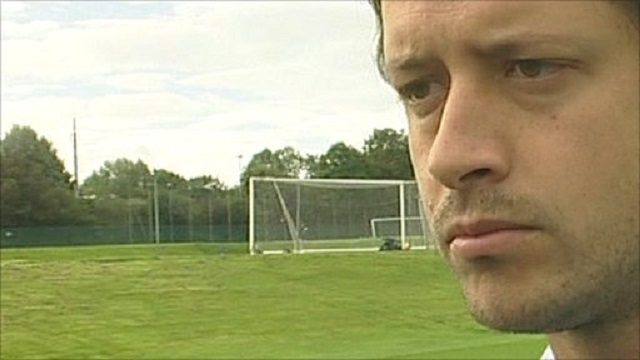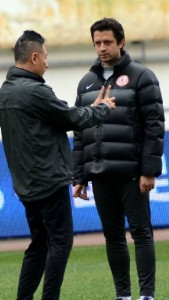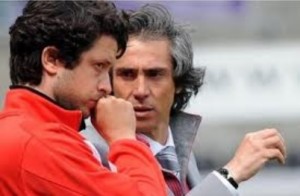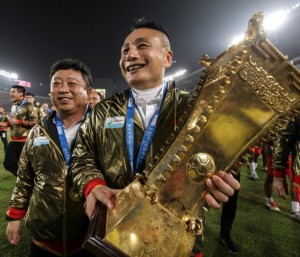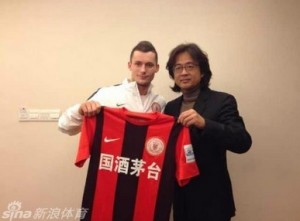A curiosity of the 2013 season was the continued reign of Guizhou Renhe’s Gong Lei as ‘caretaker’ manager at the club despite being in charge for the entirety of a successful CFA Cup winning and AFC Champions League qualifying season.
Gong Lei’s longevity in the caretaker role is surely due in part to his unsung yet richly experienced assistant manager, Bruno Oliveira.
The Portuguese has an impressive CV, including work experience at Lazio under current R&F boss Sven Goran Eriksson, and spells coaching at F.C. Porto, Queens Park Rangers, Leicester City and Swansea City.
Wild East Football’s Peter Davis spoke to Oliveira to learn more about his role with the CFA Cup winners, his thoughts on foreign player rules and a lot more.
Bruno, could you explain your responsibilities at Guizhou Renhe?
I am highly involved with the team on a day to day basis. We normally have a staff meeting to discuss the issues around the team. The head coach and I have a good relationship, and he often likes to draw on my various experiences, I was brought to the club by the owners directly who have a good relationship with my agent. They were looking to bring in an experienced assistant manager who could provide European expertise to the head coach, as well as to carry out parts of the training sessions.
One of the areas I specialize in is set-pieces and so we usually work on this a couple of times per week. It is one of the areas I definitely feel I have had a positive impact on, as over a third of the total goals this season have come directly from set-pieces. This is a massive improvement on past seasons and so I’m extremely proud to have had such an important impact on the team.
What is your back story?
Football has been my life since an early age. I was raised in a football environment and all my family work in the sports industry including my father who was also a football manager. As far back as I can remember I would go inside my father’s team dressing rooms, listen to team talks, watch training and games, feel the frustrations of defeat and the sweet taste of winning.
I started playing at 10 years old but unfortunately finished my playing career very early after having various knee surgeries. I then went to the University of Porto, which is renowned worldwide for its sports faculty. As part of my degree, I had two years work experience with SS Lazio, I was there during a particularly successful time in their history when they won the Italian League and Uefa Cup under Sven Goran Eriksson. After this I had the opportunity to write a book about the training methodology of Jose Mourinho which went on to be published in various different countries. I’ve always tried to invest the maximum in my education as a coach, always tried to learn from the best examples, and thus visited many clubs in Europe like Lazio, Fiorentina, Parma, Real Madrid, Manchester City, Manchester United and more in order to watch and learn from many top coaches like Erikson, Mancini, Mourinho, Queiroz and Ferguson.
I then started working in the Porto Academy where I stayed for a few years working with fantastic young talented players, many of whom have gone on to have excellent careers. I was also in contact with Paulo Sousa and when he got his first job in England he asked me to join him as his number two. I subsequently worked with Paulo at three clubs in England; Queens Park Rangers, Leicester City and Swansea City, which was obviously an excellent and valuable experience and definitely made me grow as a coach.
I was a young coach who had to gain the respect of players and other managers within England as well as having to adapt and evolve to a new way of football, something I feel I was successful in doing, as I still have many good friends and contacts within the English game.
It is then when I received an offer from Guizhou Renhe, the owners of the club asked to meet me in London, via my agent. I sat for a few hours with one of the owners of the club and after talking for 3-4 hours with her, I was convinced by their project, I was excited and enthused by the potential challenge. 5 days later I flew to Beijing in order to meet the other owners and sign a contract at their company’s headquarters to sign a contract.
How do you deal with the cultural differences at the club?
Like anything in life you have to be prepared to adapt and I feel I am a person who adapts easily to new cultures and surroundings. I did it at a young age in both Italy and England, and whilst China may be even more of a change, I think that I was able to quickly adapt. The fact that I can speak five languages also helps a lot especially in communication.
I always say that you must be prepared to adapt to the new surroundings and cultures, as opposed to expecting everybody to adapt to your lifestyle and culture. China is an emerging country especially in football terms and so at times some things are still behind European standards. However, before I came to Guizhou, I realized that to be successful I would have to be flexible and dynamic in how I dealt with differences.
From the outside, Guizhou seem to have a steady reputation in Chinese football, what keeps the club going so well?
The owners are hungry for success and are trying to do things the right way. They realize that things take time, and the best way to succeed is to map out a plan and then execute it. Obviously things can go off track at times, but we do our best as a club to remain calm and continue on the right path. As you can see it’s been successful with our recent FA Cup victory and also consecutive AFC Champions League qualifications, despite not being one of the biggest spenders in the CSL.
What was it like winning the CFA Cup this season? What was the feeling from the Guizhou bench?
It was a fantastic experience and an extremely proud moment both on a team and personal level. It was my first major trophy as a coach, making all the handwork and sacrifices over the season worthwhile. I had my first child [a daughter Gabriela] during the season, and so spent a lot of time away from her and my wife, and I dedicated the victory to both of them.
On a team level, it was also a very special moment. It was the first time the club had won a major honor and so we were all proud of the work we had put in as a group and also for the Owners who had invested in the team and provided us with the support to make the win possible.
The experience itself was incredible, whilst we all believed we could win, nobody else did and so to prove everybody wrong was particularly satisfying. The feeling at the final whistle was one of sheer jubilation, and I’m sure as you can imagine the celebrations carried on well into the night.
Guizhou have a Chinese legend as captain, how would you explain Sun Jihai’s influence on the side?
Sun is massively important for our team. He is our leader on the pitch, and somewhat an extension of the coaching staff. His experience in the game is massive and his knowledge of football is also excellent. Having a player like him is a huge advantage to our club. He is a key link between the local players who obviously have massive respect for him and also the foreign players who are aware of his stature in China as well as his experience in England.
Also he is still an important figure on the pitch for us, his performances have been excellent again this season, and despite his age he is still able to show his quality every game.
As assistant manager how do you use the experience of those kinds of players to benefit the squad?
Qu Bo, Sun Jihai, Yan Hao, Yu Hai etc are all very important for our team. They all have great experience and are international players, and so whilst no player is bigger than the team, they have been a great help to the club. The younger players obviously look up to them, and they are all great at helping and advising them. It is great for the youngsters to be able to see players like this giving their best everyday in training and setting a positive example.
The Bosnian connection of Zvjezdan Misimović and Zlatan Muslimović, how important are they to the squad?
They too have excellent experience in Europe. They have fitted in to the team well, and along with our other foreign players last season [Nano, Rafa Jorda, Xavier Chen and Jonas Salley] and local players we had a very successful season.
I think their connection has helped them both settle well in China, and the fact they have played together for several years is also great for us as they have a great understanding on the pitch.
What is your opinion of foreigners in the Chinese game?
Football is a global game, and so I feel it is important to have a mix of foreign and local players in any league. I think the number of foreigners in the CSL is just right and fair, it is the same as other countries in Asia. You have to get a happy medium, to ensure that growth of local players is not stunted and possibilities for them are not blocked by foreigners, whilst also ensuring enough foreigners to allow the league to be diverse and ensure differing styles of play.
Development of young local talent is important, and I think it the foreign players are and important tool in this. They allow local talent to see other styles of players and vastly experienced players up close in person and to train daily with them. Even for young kids watching on television, it’s a great way for them to be able to learn and take on new techniques and styles.
Krzysztof Mączyński looks like a great signing for you, how has he been received?
He has just arrived to our training camp, and has yet to get involved with the team [he has been mainly doing fitness work alone], so I am still learning about him as a player. Looking at his CV and history, he seems to have a good pedigree and I hope he can be as successful and adapt as well as our other foreign players, we are here to help him on that.
How do you coach with the very big issue of ‘saving face’ in China, is it tough to criticize players?
I try to always be very positive when working with the players and I don’t like to individualize the mistakes, so I haven’t really had any issues regarding that matter. Sometimes it’s inevitable to demand more from the players and to be bolder, when this is the case I still do it and I have never felt that any player were offended.
Finally, with a career that’s had you in many football crazed countries so far; I wonder do you get recognized much in Guiyang?
China is very different from Europe. At a local level, football is not as popular here as in Europe. I was often recognized whilst working at clubs in England, regularly stopped by fans of the teams I worked for who wanted to stop me and chat about the team and previous and forthcoming games.
I don’t think that’s ever happened in Guiyang, ha-ha!
Check out Wild East Football’s previous look inside Chinese football with Guangzhou Evergrande’s translator Gian Matteo Mannering.
Beijing-based Peter Davis has followed Chinese football since 2008 and is a regular contributor to Wild East Football. He can be found on Twitter and Weibo at @peteydavis
